The Checker Maven
The World's Most Widely Read Checkers and Draughts Publication
Bob Newell, Editor-in-Chief
Published every Saturday morning in Honolulu, Hawai`i
Noticing missing images? An explanation is here.
Young Blaine's Wedding: A Beacon Cafe Story

NDDOT - Creative Commons
It was 1955 and a beautiful June day in Minot, North Dakota, and it was the wedding day of Blaine and Moira. The Cornerstone Church was decorated with flowers everywhere, and the church was filled to overflowing as the ceremony began.

Picryl
Occupying seats on the groom's side of the aisle were nearly all the members of the Coffee and Cake Checker Club. Led by Sal Westerman, they had all come up from Bismarck, where the club met during the months of September through May. Blaine at age 28 was the youngest member of the club by far, all of the others being over 50 and some, like Sal, considerably so. Blaine, whom everyone called 'Young Blaine' was a junior engineer at a Bismarck based power company.

Young Blaine
The ceremony went flawlessly and to the cheers of all Young Blaine and Young Moira were duly pronounced man and wife. There was to be a reception at the Big Wolf Country Club and rumor had it that it would be especially elegant.

Ian Poellet - Creative Commons
And indeed it was. There was a large variety of appetizers and canapes; there was champagne and mixed drinks; there were cheeses and cold cuts ... all followed by a steak and lobster dinner.

Before the dancing began, the wedding cake was unveiled ... and to the astonishment of the Bismarck guests, it had a checkerboard pattern! Young Blaine, caught by surprise, was clearly delighted, and Young Moira was delighted that her new husband was delighted.
Then the dancing started up and after the traditional first dances and the dollar dance (pay a dollar to dance a couple of beats with the bride), the newlyweds were sent off in a highly decorated Cadillac, trailing tin cans and streamers. The party went on, of course.

Mieguy - Creative Commons
When it was getting near the end of the celebrations, just before midnight, the "boys" of the club were all gathered with their wives at a big round table--- and wouldn't you know it, Sal pulled out a checker problem! He had made a number of copies and distributed them to the club members.

WHITE
White to Play and Win
W:W9,19,21,22,30,32:B2,3,13,14,24,K31
"Something for you boys to amuse yourselves with," he said. "It's late now and we don't have a checkerboard, but take it back home with you and then write me with what you think is the solution some time in the coming week. Even though we don't meet until September, it will give you a little checker fun nonetheless."
The boys, of course, wanted to solve it right away, but by then it was time for the party to end and for everyone to go to their hotels to get some rest before driving back to Bismarck the next day.

Sylvia Westerman
Sal's wife, Sylvia, smiled at him and said, "Even at a wedding, you find a way to enjoy checkers." She patted his arm affectionately. Sal didn't reply. For some reason he was thinking of their own wedding, all those years ago, and how lucky he was to have Sylvia. He silently wished the same for Young Blaine and Young Moira.
Unless we miss our guess, you're not at a wedding reception at the moment (although that's certainly not impossible), and you're likely to have time to solve today's problem. We can't promise you a piece of wedding cake but we can promise to show you the solution if you click on Read More.![]()
Marvin's Checker Camp

Creazilla - Public Domain
It was the month of June, and the National Checker League had begun its summer break before training camp began in early August. During June it was customary for NCL players, at all levels, to do outreach work of some kind, whether teaching checkers at an inner city park, setting up friendly tournaments at senior centers, or providing special lessons to school kids of all ages.

Marvin J Mavin
Marvin J. Mavin, the superstar captain of the Detroit Doublejumpers, generally enjoyed the outreach work, and was often known to go to other countries where checkers was popular but there wasn't always money for professional coaching. He especially liked working with youngsters who had a dream of themselves one day becoming a superstar.

Picryl - Public Domain
There was an assignment available in southern Chile, and Marvin put in for it. It would be the depths of winter in the Southern Hemisphere, and he didn't think anyone would want that posting. But to his surprise, he was turned down.
In a phone call from his head coach, Mr. Baba Dudut, Marvin heard these words.
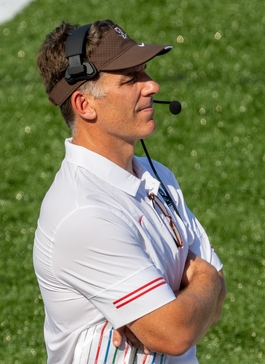
Coach Baba Dudut
Creative Commons
"I know you wanted that assignment in Chile but I made sure you didn't get it. You've caused me a lot of trouble, you know." (Editor's note: See previous stories for details.)
"Aw, c'mon coach, you know no one else wants to go to southern Chile in the winter ... "
"I don't care. You're not getting what you want. I have something else in mind for you."
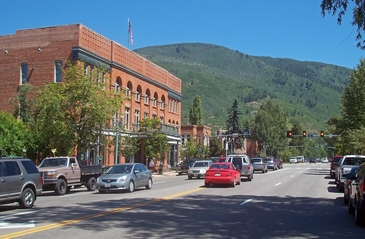
Daniel Case - Creative Commons
Coach went on to explain that there was to be a two week long executive camp being held in Aspen, Colorado, which would be attended by top executives from around the world.
"The execs won't settle for anything but a superstar player to lead the camp, and like it or not, you're it. It's a chance for you to redeem yourself. These are very important people so go to Aspen a week early and make sure you have your program arranged."
"But Coach ... "
Coach Baba Dudut had already hung up.

Priscilla Snelson
Back at home, Marvin told his wife, Priscilla, about the phone call and the assignment. Prscilla was the CEO of the large international conglomerate Rust Belt Holdings, and had her own view of events.
"Marvin, that's wonderful," she said. "You can make some good contacts. In fact there will likely be other CEOs there who I know and with whom I transact. It's a pity I can't go with you. But maybe you can pass along my greetings. Good for business all around."
Marvin wasn't so sure about any of it. A room full of giant egos? Priscilla would take to it but he certainly wouldn't.

Marvin didn't have much choice and on the appointed day he flew into Aspen's airport and took a taxi to the five star St. Regent Resort. The hotel offered the height of luxury and service and was very expensive, as you might expect for a venue where top CEOs were to meet.
Marvin met that evening for dinner with Mr. Sbrinz Etivaz, the Swiss-born director of the hotel.

Mr. Etivaz
"Everything is pretty much arranged, Mr. Mavin," he said over an appetizer course of smoked organic celery and roasted Mediterranean peppers. "Accommodations and meals are all planned. You'll find the schedule in your email. These CEOs are of course busy people, so your seminars will run from 9 AM to noon. Afternoons are reserved for the CEOs to tend to their businesses, and they have evenings reserved for networking and leisure. I do hope it's clear that you are to neither take meals with the CEOs, disturb their afternoon schedules, nor participate in evening activities. After all, despite your star status in checkers, the CEOs consider you to be 'hired help' at the servant level. You can eat in the main common dining room. In the afternoons and evenings I suggest you go over your material for the following day so as to ensure the flawless presentation the CEOs have every right to expect."
Marvin looked up from his food. "So, I ain't got no status?"
Mr. Etivaz gave Marvin something of a look. "No, you 'ain't'," he said with disdain, "and from here on out you will deal only with the Assistant Director of Protocol, Ms. Betty Butterfly, who will ensure everything goes smoothly. Please follow her directions to the letter and let her know if there are any difficulties."
"I see," Marvin said. "Well, whatever .. "
"Let me be clear, Mr. Mavin," Mr. Etivaz went on. "I know you have something of a ... reputation. Do not bring dishonor upon this establishment if you know what's good for you."
A waiter arrived with the main course. There was only one plate, which he set in front of Marvin and then went off.
Mr. Etivaz stood. "Enjoy your dinner, Mr. Mavin. I am a busy man and cannot spend any more time with 'hired help'."
Marvin did spend the next several days working diligently on a program. He'd start with the basics such as simple tactics and how to win two kings against one. He'd move on to more advanced tactics and something about midgame landings toward the end of the first week. In the second week he'd get into go as you please openings and finish the camp with a one day "graduation" tournament. He did wonder why top CEOs would spend two weeks away from the office to go to a checker camp. Maybe he'd find out when the execs arrived.
They started coming in on Sunday, a couple at a time. The camp was limited to 20 participants. There was an evening reception for the CEOs that night, hosted by Mr. Etivaz, but it was very clear that Marvin was not invited.

Marvin did meet the CEOs at the first session on Monday morning. There were participants from across the US and Canada, as well as Mexico, France, England, and several other countries; there was even a participant from the Marshall Islands.
After introductions, Marvin set to work. He was a little dismayed about most of the participants spending significant time texting and reading email on their phones. A number of them stepped out from time to time to make or take phone calls.
At the end of the session, just before noon, Marvin told them that their homework assignment could be found in their notebooks.
The next morning, Marvin asked for volunteers to demonstrate solutions to the homework problems. No one stepped up.
"Okay, then, how about you," Marvin said, pointing to the CEO of a major New York City construction company.

"Don't you go pointing your finger at me, boy," the man said. 'For your information we're busy people and we don't have time for childish things like homework."
"All right," Marvin replied, "then I'll just show you."
Marvin played out the solutions and then continued on with the lessons. But the same pattern played itself out all week and into the next week. It was obvious that the CEOs weren't learning very much, if anything, and they became less and less attentive each day. Some of them stopped showing up. On Wednesday of the second week, in the early afternoon Ms. Butterfly asked to see Marvin. They met in Ms. Butterfly's office.

Ms. Betsy Butterfly
"Mr. Mavin, some of the CEOs at your 'camp' have checked out early, saying they just didn't have time for 'this sort of thing.' Frankly, we're very disappointed."
"Me too," Marvin said. "They don't pay attention and even don't show up sometimes. They ain't never done no homework neither and I think they ain't learned nothing."
Ms. Butterfly leaned forward. "Well, that's on you, isn't it, Mr. Mavin. These are important people. It's up to you to hold their attention and keep them engaged. If you haven't done that--- and obviously you haven't--- then you've failed."
"Whaddya mean? They don't listen. They don't do no work. They don't ... "

"I don't care about your excuses. Save your breath. Now, there are two days left and still about a dozen CEOs remain. You had better make it good if you don't want a very poor evaluation sent back to your League executives. Thank you for stopping in, but I'm rather busy and need to get back to work." Ms. Butterfly picked up some papers from her desk and started looking at them. It was obvious to Marvin that he had been dismissed.
Marvin thought about things for several hours and on into the evening, after his solitary dinner at the main dining room. Finally, he came up with a plan.
The next morning the attendance was down to about 10.
Marvin stood at the front of the room and bellowed, "Listen up, people."

Heads raised from cell phones to stare in surprise.
"Now, you all think you're some kinda big shots, and that's great and stuff, but I came here to teach you checkers and none of you ain't learned nothing as far as I can see. So here's how it's going to be for the last two days. Put all of them cell phones away and leave 'em away. Pay attention and answer when I call on you. Do your homework tonight cause like it or not there's a little tournament tomorrow and you're all playing and I don't want no complaining. If you can't do things my way, you can leave now."
One CEO did get up and, with much harrumphing, actually left.
Another spoke up. "You don't get it, do you son. We're busy people, and we're playing chess, not checkers, in our business lives."

Now Marvin, like any red blooded checker player, didn't care for the chess vs. checkers analogy. "First of all, mister, I ain't your son. And second, if you're playing chess why are you at a checkers camp?"
"To network, what else," the CEO replied. "You think any of us really care about checkers? Like I said, we're playing chess while ... "
"Stuff it!" Marvin said. "If you think you're playing chess in your business, fine. But maybe you should be playing checkers. It's a game of finesse. But I guess you ain't got none of that."
There were howls of laughter from the rest of the CEOS while the man who had spoken turned red in the face. But before he could speak again, Marvin said, "Let me show you something."
There was a laptop connected to a projector, and the CheckerBoard program was running on it. Marvin put it in setup mode and had it display the following position.
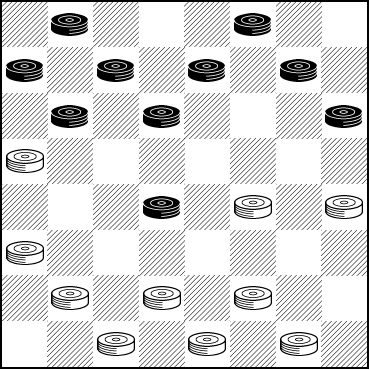
WHITE
White to Play and Win
W:W13,19,20,21,25,26,27,30,31,32:B1,3,5,6,7,8,9,10,12,18
"Now," he said, "suppose this is a business situation. Your company is White and your rival is Black. As you can see your markets, represented by the number of pieces, are equal. But your competitor has just made a little error and now you want to get a winning advantage. How do you do it?"
The CEOs actually now showed a little interest. One of them spoke up. "When I'm head to head with a competitor," she said, "and the markets are even, I find a weak spot and go after it and crush them."
"I don't know," another CEO said, "a direct attack could be risky. What if it backfires? Won't you be the one to lose then? Or what if they try to do the same thing to you?"
The discussion went back and forth. Marvin began to smile for the first time since he arrived in Aspen.
Finally he said, "This was a good discussion and it's very relevant to checkers. Let me show you a couple of things."
Marvin, finally had everyone's rapt attention, and there was not a cell phone in sight.
Most of our readers are likely not "top CEOs"; after all, checkers is a game for everyone. But you don't have to be a CEO to enjoy today's problem position. After you've given it some thought and effort, click on Read More to see the solution and the rest of the story. And--- our apologies to those of you who are top CEOS.![]()
Uncle Ben's Porch
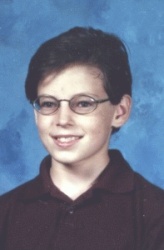
Tommy Wagner
Tommy Wagner, a sophomore at a large high school in Florida, had played first board on the varsity checker team's second team for the first few matches of the school year. That was pretty outstanding for someone with just a year of high school competitive experience, but Tommy really wanted to move up to first team. In our last story, Tommy tried out and just missed gaining the fifth board slot. He was pretty down about it but with the advice and encouragement of Uncle Ben, a retired checker professional, Tommy pulled himself together and performed excellently on the second team.
Now, Uncle Ben wasn't really Tommy's uncle, but everyone called him Uncle Ben. He was kindly and patient and instructed a small number of promising students. Tommy visited Uncle Ben on most Saturday mornings for a checker lesson and a few glasses of Uncle Ben's renowned lemonade.

Coach Schann
But a couple of matches into the season, the coach of Tommy's team, Coach Schann, noticed that the fifth board player on the first team, Duwayne Zigley, hadn't been playing well. Coach decided to bench the player in the team's next match, and told Tommy he would be playing 5th board on the first team--- on a trial basis.

"It's up to you," Coach said to Tommy after he had Tommy report to his office. "If you play well, you might get to replace Duwayne."
Now, in a playoff match last spring, Tommy had blundered in a game with Duwayne, and that had given Duwayne the spot on first team. Tommy only replied, "Thank you sir," to Coach and then went on his way. At first he was elated to have a chance to play on first team. But after thinking about it for a while, he felt bad that it was at the expense of Duwayne, who would play second team for at least one match, and wouldn't be able to return to first team if Tommy played well.

Tommy wondered if getting on first team at Duwayne's expense was what he really wanted. But what to do? Turn down the opportunity? Coach probably wouldn't let him even if he asked. Coach was a good person but he expected the team to follow his directions without fail. Neither could Tommy see himself playing anything but his best game; he certainly wouldn't let up and disappoint his teammates.
So he took his question to Uncle Ben on the following Saturday.

"Tommy," Uncle Ben said, "I think you've asked a two glasses of lemonade question. There's a lot more to this than you might think.
"First, it's good of you to think about your friend Duwayne's feelings. He had earned that first team position and you acknowledged that, despite your blunder in the final game, Duwayne deserved it.
"It's also good of you to realize that you have an obligation to obey your coach and an equal obligation to support your team."
"Yes, Uncle Ben," Tommy replied, "but I feel so bad about Duwayne getting demoted. I think how I would feel myself, and it wouldn't be very good."
"When you lost that crucial game to Duwayne, I know you felt bad. But it was a competition. You lost fair and square, and in the end Duwayne remained your friend and your teammate. Did you expect Duwayne to feel bad on your behalf?"
"No, of course not, but he kind of did ... but like you say, he won fair and square and I told him as much."
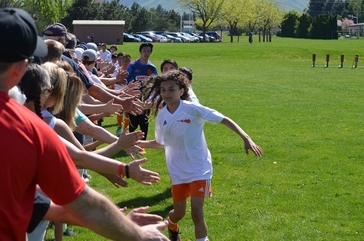
"That's good sportsmanship shown by both of you. Now, who is moving Duwayne to second team? You, or Coach?"
"Coach, but ... "
"Yes, Coach, that's his job and sometimes he has to make some very tough calls in the interests of the team. Now, who is going to decide if Duwayne stays on second team, you or Coach?"
"Well, Coach, but ... I mean, if I play well then it's kind of like I am, right?"
"No Tommy, not quite right. You have an obligation to your team to give every game your best. Coach will make the decisions after that, not you. Meanwhile Duwayne should give his best on second team and if another first team slot opens up, earn it just like he did last spring. Does that make sense?"
"Yes, Uncle Ben, that helps a lot. We all give 100% and do our best, and Coach will decide who plays where based on the needs of the team. Did I get it right?"
"You sure did, Tommy. But there's one more thing."
"What's that, Uncle Ben?"
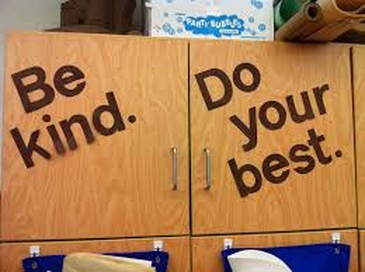
"It's not just in checkers ... in life, we need to care about others, just like you care about Duwayne. But we always need to give our best to support those around us. And if we always give our best, no matter what happens, we can look at ourselves in the mirror with self-respect. You may not fully understand that now, but hopefully as the years go by, you'll always be one who does all they can and then calls it good."
Uncle Ben poured some more lemonade. "But now, let's get into today's studies. Go over to the checker board and see if you can solve this one."
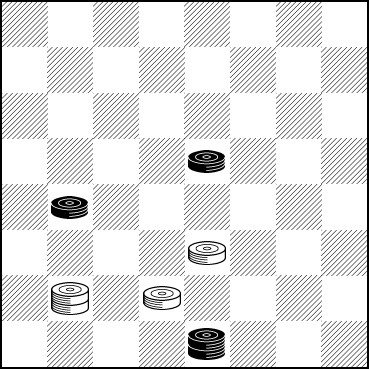
WHITE
White to Play and Win
W:W23,26,K25:B15,17,K31
Tommy took a sip of the lemonade and focused in on the position. He was content. Uncle Ben is a wise man, Tommy said to himself, and continued, maybe one day I can be wise like that too.
Uncle Ben is indeed wise; after all, he's a character inspired by the real-life Ben Boland, one of the great checker educators and writers of recent times. (Our stories are entirely fictitious, of course.) In any case, we invite you to apply your checker wisdom to today's problem, which is just a sample of the many examples of the theme that you'll see by clicking on Read More. The problem above is No. 1 in the "Sister Problems" section.![]()
Rematch: A Marvin J. Mavin Story

Marvin J Mavin
In our previous Marvin J. Mavin episode, a match between the Portland Pitchers and the Detroit Doublejumpers ended in a declared win for the Pitchers. This was due to a controversial interpretation of rule 3.1415926, which states that if the board is upset during the final minutes of a time control, the player on move when the board was upset forfeits the game. Marvin, unfortunately, was on move when the dome ceiling of the Pitchers' home arena cracked and rainwater poured down on the playing area.
Doublejumper management filed an immediate appeal with the National Checker League Commissioner, Axel Homeboy.
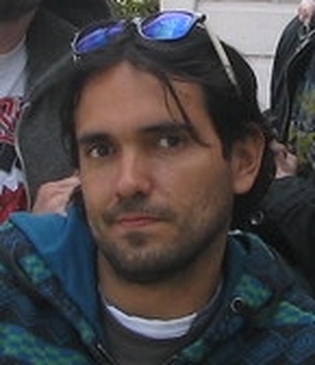
Axel Homeboy
The referee had claimed that rule 3.1415926 was absolute and didn't refer to fault or intent in upsetting the board. Doublejumper manager Baba Dudut said this interpretation was unreasonable and intent should be factored in.
A small hearing took place in the Ohio offices of the National Checker League. Present were Baba Dudut, Marvin, Commissioner Homeboy, and the referee of the match in question, Willy Will Wilson. Also present were D. Rock Noodle, Marvin's opponent in the disputed game, and the Pitchers' coach, Lefty Leftwing.

Leftie Leftwing
Baba Dudut started out with, "The rule's interpretation was ridiculous. Mr. Mavin didn't upset the board, the rainwater did. It's the Pitchers fault for not maintaining their stadium. They're the ones that should forfeit."
Lefty Leftwing snapped back, "Hey man, we ain't got no money on accounta police harassment."
"Can you explain that?" the Commissioner said. "No, don't bother, it's irrelevant."
"Defund the police, man," Lefty said, but meanwhile Willy Will had spoken up.
"I calls 'em as I sees 'em," he said. "The rule is what it is. Not up to me to redefine it."
Marvin looked as if he wanted to say something but Baba Dudut hissed, "Remember what I told you, not a word--- you're in enough trouble as it is."
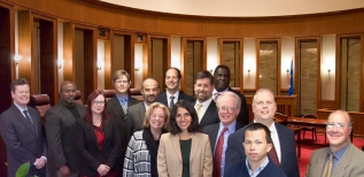
NCL Lawyer Team
The argument continued for several more minutes. Finally the Commissioner said, "Enough of this. Rule 3.1415926 is poorly written and needs to change. I'll turn that over to our lawyers and for a few million dollars they should be able to come up with a wording change in a couple of years. But meanwhile we have to resolve this. My decision is that the game be replayed right here and now, in this office to settle the matter."
Marvin and D. Rock looked at each other. Lefty and Baba looked at each other.
"But Marvin was going to ... "
"But the rule says ... "

"Stop!" the Commissioner commanded. "Replay the game right now with no further discussion!"
Meanwhile assistants had set up a side table with a checker board and set.
"Well, you heard the Commissioner!" the two coaches said almost simultaneously to the two players.
Marvin and D. Rock sat down. There was no handshake. Willy Will Wilson didn't have his whistle along and so couldn't blow it. The game began.
After a while, the following position was reached with Marvin to move. Again, all he needed was a draw. Just as Marvin was about to make his move, D. Rock started singing, "Raindrops Keep Falling On My Head" in a loud voice.
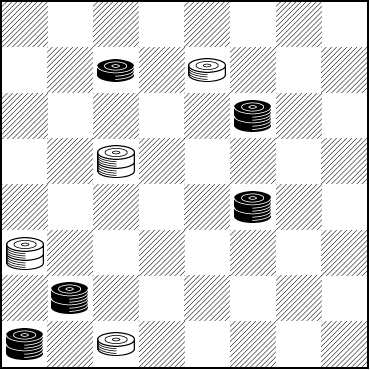
WHITE
White to Play and Draw
W:W7,K14,K21,30:B6,K11,K19,K25,K29
"It won't work, bro," Marvin said, "not this time."
He made his move.
In this tense situation, what would you have done? You "only" need a draw ... can you find it? Give it your best and then click on Read More to see the solution and the rest of our little story.![]()
Summer is Coming: A Beacon Cafe Story

Memorial Day weekend was coming up and it was the last Saturday afternoon meeting of the Coffee and Cake Checker Club before the summer break.
As our regular readers know, the club met weekly from just after Labor Day until just before Memorial Day at the Beacon Cafe in the Provident Life Building in Bismarck, North Dakota. The year was 1955 and the informal club leader was Sal Westerman, an elderly gentlemen who loved his Saturday afternoons with the "boys" as he called them, even though all but one of them was over 50 years in age, and some, like Sal, considerably more so.

Young Blaine
But the discussion this afternoon was about that one younger member. Usually at the last meeting of the season, the boys would all talk about their plans for the summer. Today, however, Young Blaine was once again the topic of conversation (see previous Checker Maven stories for further background).

Moira
Blaine had been engaged to Moira for over a year now and Moira had pressed him to set a wedding date. Blaine, after much prompting and not so thinly veiled threats--- Moira called them promises--- about moving on, Blaine relented.
In short, the wedding was set for June and all of the boys were invited. It would take place in Minot, North Dakota, Young Blaine's original home, about 90 miles north of Bismarck.
Young Blaine, as usual, was red-faced as the boys alternately teased him and plied him with questions.

"So, a big wedding with hundreds of guests, a marching band, a steak and lobster banquet, and so on?" Dan asked. "Seems like the minimum for someone who's waited so long."
"Hey wait a minute," Young Blaine said, "Moira's parents are paying for most of this. They aren't exactly super wealthy. It will be a nice, modest wedding, with quite a few guests but what Moira calls a 'small and tasteful' reception. Sorry, guys, no steak and lobster. She's talking about finger sandwiches."

"You mean those things where the cut off the crust and roll them up? And they're filled with colored cream cheese or something?" Wayne said.
"I'm leaving all that up to Moira," Young Blaine replied, "I know better than to try to even suggest anything to her. I'd like hot dogs and burgers, actually, but it'd be about worth my life to say so."
"Well," Sal intervened, "I"m sure all of us that can be there will be there. I'm grateful for your invitation and Sylvia and I will surely attend. No matter what the venue or the menu, I'm certain it will be a nice affair."
Young Blaine looked relieved. "Thank you, Sal, I appreciate it, but now can we all just enjoy some checkers before the summer break?"
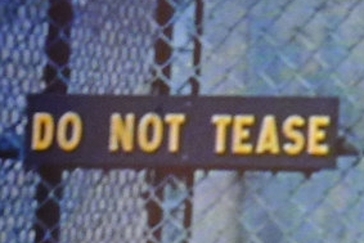
"Okay, okay," said Delmer, but he said it with a smile. "I suppose we've teased you enough for one day--- but then, tomorrow's another day!"
Everyone laughed, but then turned their attention to Sal, who was laying out the following checker problem on a couple of the boards sitting on the table of the big booth the boys were occupying.
WHITE
White to Play and Win
W:WK3,13,22,23,26,28:B5,8,16,18,19,27
Now, the tradition was that if the boys couldn't solve Sal's problem they'd buy treats for Sal and his wife Sylvia, but if they did solve it, Sal would buy for the boys. And the treats were something special, baked on premises by Deana Nagel, the proprietess of the Beacon and a star baker.

Deana was also great at marketing, and when she saw Sal setting up the checker boards, she called out from behind her counter, "Sorry boys, I don't have wedding cake today, but I do have freshly baked cherry bars!"
There were nods and smiles from the boys, but they were already starting to discuss Sal's selected problem.
"45 minutes," Sal said, "that should be time enough."
As always you'll have to supply your own treats and coffee, but there's no limit on how long you take to solve the position above. See how you do and then click on Read More to see the solution.![]()
April Showers: A Marvin J. Mavin Story
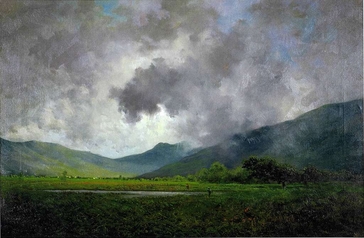
It was April and the common saying about "April showers" had taken on a new meaning for Marvin J. Mavin and the Detroit Doublejumpers of the National Checker League.
The Doublejumpers were in Portland, where the old Portland Playpen Arena was still in service for the matches of the Portland Pitchers. The Arena was showing its age. Seating capacity had been reduced about 25% during bad weather because of leaks in the dome roof. The playing field itself had numerous wet spots, and play would have to take place not in the center of the field, but off to one side where the pitch remained dry.

Of course the fans were not happy and neither was team management, who saw declining ticket sales and revenue. Portland has a lot of rainy weather and it was becoming quite a problem.
Portland city government promised to build a new stadium in order to keep the team from moving to another city. Tucson, Arizona, had made an offer and pointed out that there weren't rainy weather problems or even leaky roofs to worry about. Of course Portland had promised a new stadium for a couple of years and allowed as how they could surely get it built in less than 20 more years--- or maybe a little longer than that; they didn't really know.
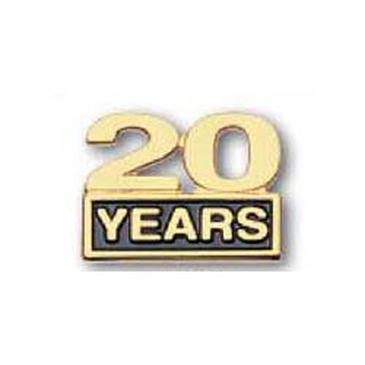
The irony was that Portland had been playing quite well this season and would likely make the playoffs, which were just about a month away. But fans just didn't want to come out and sit on wet seats and have a non-optimal view.
So it came about that in the first match of a three-match series, the weather was bad even by Portland standards and attendance was only about 8,000 in a stadium that was supposed to seat 50,000. But the show must go on, and on first board Marvin met up with an old foe, D. Rock Noodle, who had played first board for the Pitchers for quite a little while. Ever since they had first met, Marvin had been avoiding D. Rock's crusher handshakes, despite D. Rock's taunting.

D. Rock Noodle
The roof leaks were pretty bad on such a rainy day and the playing area had been set up in a slightly less wet area along what would have been the foul line in left field in a baseball stadium. Even there, the ground was slightly wet and the grounds crew had put down a tarp. Stadium management thought of erecting a tent roof over the area but that was finally vetoed as it would restrict the view of the fans even more. There was always the option of moving the match indoors to one of the conference areas but that would mean issuing full refunds plus additional vouchers as compensation to all ticket holders and management couldn't bear the expense.

The starting whistle blew and the call "Play Checkers!" rang out. The teams were surprisingly closely matched. Boards 2 through 4 produced draws; board 5 was a Doublejumper win, leading to a score of 2.5 to 1.5 in favor of Detroit. Everything was now up to Marvin and D. Rock on board 1. If Marvin could draw, the score would end at 3-2, giving the Doublejumpers the win. However if Marvin lost, the score would be 2.5-2.5, and since tie-breaks went from highest board to lowest, the loss on board 1 would give the match to the Pitchers.
The game reached a very tense position with Marvin to play. Both players were short on time, even with the 40 moves in two hours time control, and it looked like things could go either way.
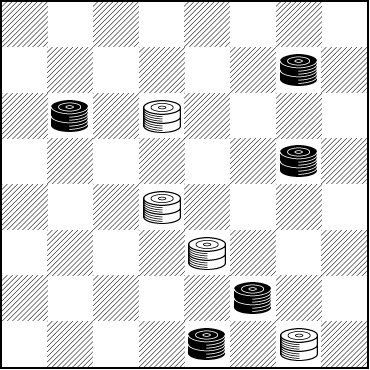
WHITE
White to Play and Draw
W:WK10,K18,K23,K32:BK8,K9,K16,K27,K31
Marvin, though, had an idea. With just under a minute left on the clock, Marvin reached out ...

There was a loud crack high overhead in the stadium dome roof, and all at once a torrent of water poured down directly on board 1! Both Marvin and D. Rock were knocked from their chairs and the board swept off the table.
Marvin and D. Rock picked themselves up. Both of them were soaked through, and rain continued to pour down through the new, large hole in the roof.
The referee, Willy Will Wilson, blew his whistle. "Game over!" he called out. "Win for Black!"

"Hey, ref, wait a minute," Marvin said, all the while trying to shake off some of the water from his arms, legs, and head, "I was going to make my move and draw the game. How do you get a win for Black here?"
D. Rock laughed. "Sorry, pal," he said. "The ref knows the rules. Game adjourned. And since we passed the four hour mark, Rule 3.1415926 says in time scramble situations, disruption of the board results in a loss for the player on move. You lose, fella."
"The rule was quoted correctly," said Willy Will. "After four hours the board is not reset. Player on move loses. Black wins." He blew his whistle again for good measure.

Coach Baba Dudut
Within seconds the Doublejumper coach, Baba Dudut (who had replaced Davey Anderson after the controversial events we recounted in last fall's stories), was on the field, confronting the referee. "Just a minute there!" Baba said. "We didn't reach four hours. Look at the clocks. We're still in the first time control. Marvin had 48 seconds left and D. Rock had 54 seconds. And besides, upsetting the board was an act of nature, not deliberately done by my player!"
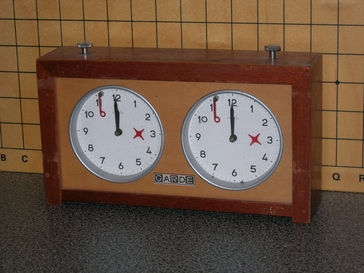
Baba Dudut reached down and pulled the game timer out of the sodden mess that the pitch had become. But the clock was completely filled with mud. "Oh ... well never mind, look at the stadium clock!" he told Willy Will.
"Stadium clocks are unofficial," Willy Will said, "and rule 3.1415926 doesn't take into account deliberate or non-deliberate board upsets. Do I need to blow my whistle again? Black wins and Portland wins. Clear the field, everyone. Go change into dry clothes."
"I'll appeal!" said Baba. "You'll regret this! You should have let us finish the match indoors!"
Willy Will did not reply, and Marvin looked as if he was about to speak, but Baba turned to him and said, "Not a word from you! You'll just say something dumb and make things worse!"

Meanwhile D. Rock continued to laugh and the few fans that were still in the stadium, all of them Pitcher fans, were hooting and hollering.
Willy Will blew his whistle one last time and ordered everyone off the field, making threats of fines and suspensions.
"Oh, go blow your horn!" Baba said in disgust as he took Marvin by the elbow and led him to the dugout exit.
"Coach, I coulda ... " Marvin began but Baba cut him off. "I don't want to hear it! Coulda, shoulda, well, you shoulda been faster and made your move before the roof cracked! You haven't heard the last of this!"
Marvin shrugged his shoulders. "Gee, how was I supposed to know that the roof ... "
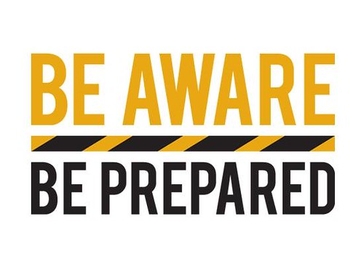
"A player should always be aware!" Baba snapped. "No matter what!"
To be continued.
We'd say Marvin is in hot water again but the rainwater that soaked him was probably pretty cold. Did Marvin have a draw on the board before the "April showers" ended the match? (Do you think rule 3.1415926 is fair?) See what you can work out and then click on Read More to get the answer.![]()
Easter 1955: The Beacon Cafe Is Closed!

It was Saturday, April 9, 1955, the day before Easter Sunday. It was the regularly scheduled meeting day of Bismarck, North Dakota's Coffee and Cake Checker Club, informally led by the respected elderly gentleman Sal Westerman. The club met every Saturday from just after Labor Day until just before Memorial Day, with a brief break for Thanksgiving, Christmas, and New Year's.
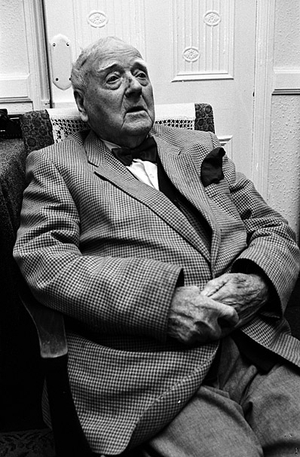
Sal Westerman
But today there was a problem.
The club invariably met at the Beacon Cafe, a popular local spot run by championship baker Deana Nagel. Saturday afternoons post-lunch were typically slow and Deana welcomed the Club and was friends with all of the "boys" (all but one of whom were over 50 years of age). However, this year Deana closed up for the Easter weekend. It was something she hadn't done in prior years but this year, she wanted to spend the weekend in Gackle, North Dakota, where her aging grandmother had come from Iowa for a rather rare visit.
Of course Sal could hardly blame Deana; certainly she should visit with her grandmother. But that left open the question of what to do about the club. The "boys" had discussed it the prior week and didn't come up with much in the way of a solution. The public library was a possible option but coffee and treats were not permitted on premises. There were other cafes and coffee shops but the boys were used to meeting at the Beacon.

Deana Nagel
"We could go to Bob's Big Boy," Delmer had suggested the previous week. Big Boy had just opened the prior year and was a popular spot. But Wayne pointed out that they didn't have indoor seating. A couple of other options were reviewed. The general feeling was not to go to a bar or a hotel lounge, and restaurants tended to be too busy.
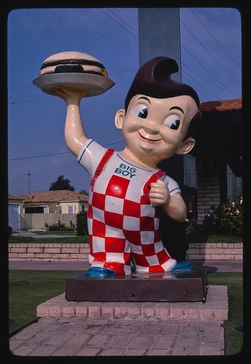
It must have been Louie the Flash who suggested gathering at Sal's home.

Louie the Flash
"Oh, I don't know," Sal had said, "I'd have to ask Sylvia." Sylvia was Sal's wife of many decades. "And our house is pretty small."
"Hey, I've visited you and your basement is set up for checkers," Dan said. "We can all squeeze in, and we can go pot luck on bringing the treats."

Sal said he would think about it and that evening he asked Sylvia, who agreed, if a bit relucantly. "Whatever makes you happy, Sal," she said, "but just don't expect me to bake for everyone. I have an idea those boys of yours can really eat. And drink coffee, too."
The day arrived, and right on the dot of 1 PM the boys started to arrive. Delmer was first, followed by Wayne, Dan, Louie the Flash, and Larry. They all brought sacks of baked goods and thermos of coffee. The last to arrive was Ron, who brought a large mixed flower bouquet for Sylvia, to recognize her generosity in opening her home to the Club.

It was a bit of a tight fit in Sal's basement, but he had gotten out a large folding table and folding chairs and there was just enough room for everyone. The boys drank coffee and munched on treats and talked checkers until finally Sal said, "Okay, let me put out a checker problem for you to solve. No one needs to buy treats today so solve it just for fun.
Sal went over to a large bookshelf which was overflowing with checker books, magazines, and newspaper clippings. He laid out the following position from a diagram in one of the magazines.
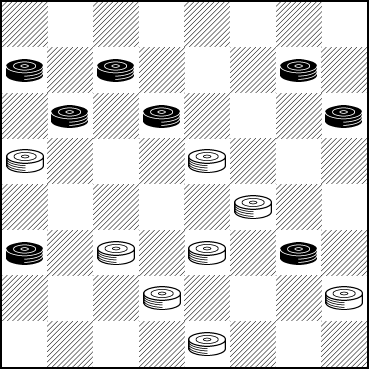
WHITE
White to Play and Win
W:W13,15,19,22,23,26,28,31:B5,6,8,9,10,12,21,24
"This is a good one," he said. "Take your time and see how you do."
The boys dug in at once and the discussions became quite animated. Nearly an hour went by until Ron said, "We've got it, Sal!"
Sal's basement den looks like a nice place to be solving a checker problem. We hope you have a comfortable environment, too. Join the "boys" in solving this one, and click on Read More to check your solution.![]()
Beacon Cafe: School Board Meeting

Sal Westerman
In our previous Beacon Cafe story, Sal Westerman, the unofficial leader of the Coffee and Cake Checker Club, had been confronted by protesters who claimed that checkers was part of a Communist plot to ruin America.
Sal's club met on Saturday afternoons from just after Labor Day to just before Memorial Day with short holiday breaks. The year was 1955 and the venue was the Beacon Cafe in Bismarck, North Dakota, a locale that was about remote from Communism as anywhere.
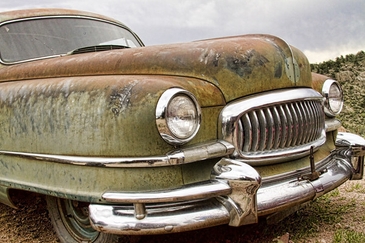
The protesters had been dispersed by the police but their activities were far from over. One of them in an old Nash car trailed Sal on his way home. And then there were harassing phone calls to all the members of the club, but especially to Sal's home. His wife Sylvia had gotten quite upset, and Sal had gotten the police involved, but there wasn't a lot they could do.
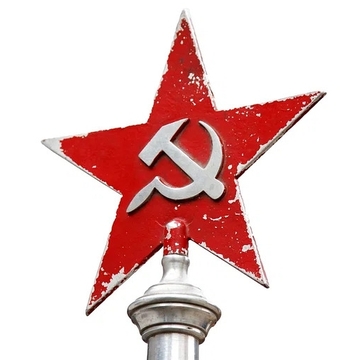
However, it might all come to a head soon. One of the protesters' purposes was to have checkers eliminated from the public schools. Now Bismarck, like nearly all towns (in the alternate reality of our stories) had a thriving scholastic checkers program with teams competing at every grade level. But the protesters said that this was just a means of spreading Communism. They didn't present evidence except to say that there were red checker pieces, symbolizing Communism, and that players often played in teams, which apparently reflected anti-capitalist collective policy.
The school board would meet tonight to take up the matter, and Sal and the "boys" of the club (all but one of whom were over 50) would give testimony. Sal's testimony, as State Champion, would be expected to hold some weight, and it was also expected that saner heads would prevail. However, the outcome was still uncertain given the just-concluded McCarthy era.
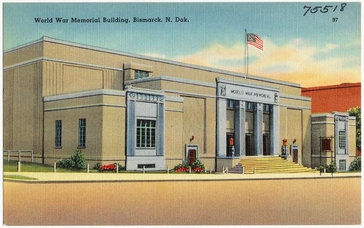
That evening, a line of marching protesters greeted arrivals at the War Memorial Building, where the school board was to meet. Police were on hand to try to keep things orderly, but the protesters were on the rowdy and raucous side, chanting various slogans about the purported ills of checkers.
"There's their leader--- the chief Commie himself!" one of them shouted as Sal made his way to the entrance, followed by the rest of the "boys." Sensing potential trouble, a couple of policemen stood between the protesters and the checker club members.
Fortunately everyone made it into the building without incident. By the time 7 PM came around there were no seats left and attendees were standing in the back and on the sides of the main auditorium. At a few minutes after 7, School Board chair Janet Meyer called the meeting to order and ran through a number of routine business items with the rest of the Board.

At 8 PM, with some of the crowd growing restless, Mrs. Meyer turned to the final item on the agenda. "We have a proposal from a group called 'The Anti-Communist Anti-Checkers Coaltion'", she said into the microphone. "They have a petition signed by over 200 Burleigh County taxpayers, so we must take up their issue. I'll ask their representative, Mr. Gerry Russell, to present their case."

Gerry Russell
Mr. Russell took the podium to a mixture of cheers and boos, loud enough for Mrs. Meyer to pound her gavel and call for order.
"Checkers is a evil game," Mr. Russell began. "It corrupts our children by teaching them to love Communism and hate capitalism. It is anti-American and anti-church. Do you want your children to end up in jail for treason or seeking to overthrow our government? That's what will happen if we don't ban checkers from our schools, our community, and our nation! We are here to take the first step, casting this evil influence out of our precious school system."
Mr. Russell went on for a long while until finally Mrs. Meyer asked him to please conclude his speech.

"Very well," he said, "I'll end by saying I am a checkers expert and know everything about this horrid game. I was under its influence too for many years. But fortunately I was able to cast out the devil within me, and I saw the light. I pray that you see the light, too, and do what you know is right--- ban checkers in the schools!"
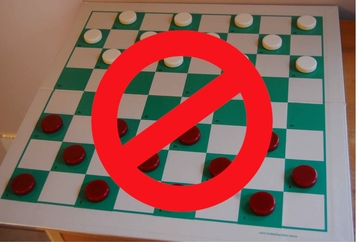
Mr. Russell sat down to more cheers and boos. Mrs. Meyer then said, "A local checker club, the Coffee and Cake Checker Club, led by Mr. Sal Westerman, the State Checker Champion, has asked to respond. Mr. Westerman, please come to the podium."
There were mostly all cheers for Sal as he made his way onto the stage although there was some heckling from the protesters.
"Thank you, everyone," Sal said in a calm and measured tone. "I am here to demonstrate the error of the ways of Mr. Russell and his group. Checkers, far from being evil, is a positive influence on a young mind. It teaches planning ahead. It teaches sportsmanship. It teaches our children to be gracious winners and resilient losers. It teaches the benefits of hard work and study. But it does more than that. It teaches how to focus and to think through a problem with persistence and attentiveness. It develops analytical skills which will serve for a lifetime."
"Prove it!" a protester shouted.
Sal smiled. "That is my intent," he said. "Mrs. Meyer, may I use the projector?" When permission was granted, Sal put a transparency with the following diagram on the projector's plate and projected it onto the screen at the front of the auditorium.
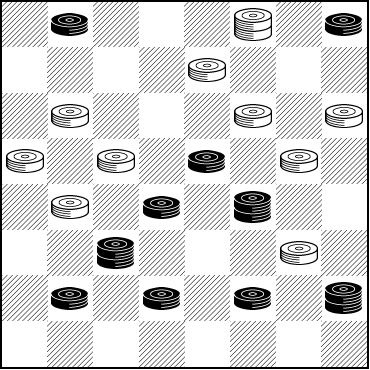
WHITE
White to Play and Win
W:WK3,7,9,11,12,13,14,16,17,24:B1,4,15,18,K19,K22,25,26,27,K28
"Now, Mr. Russell, as you say you know everything about checkers, I challenge you to come up to the stage and solve this checker problem. Surely you should be able to do that."
Mr. Russell, sitting in the front row, was clearly taken aback. "A checker problem? How dare you expose the attendees to such evil! I will not come up and participate in this shameful activity! You may be a Communist, but I am not!"
"Come now, Mr. Russell, the checkers on the diagram are black and white. There's not a trace of red." That elicited a laugh from the audience but a scowl from Mr. Russell.
"Very well then, you just move ... wait a moment ... no, you move ... hmm ... it must be ... "
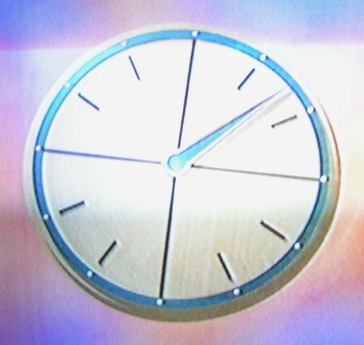
"Five minutes, Mr. Russell," Sal said. "That's enough time for any expert to solve it."
Mr. Russell had turned pale and had begun to sweat. "Fine, you play ... no, that's not it ... okay ... "
"The clock is ticking, Mr. Russell," Mrs. Meyer said, "and I think we are all interested in how this will turn out."
Sal has put his opponent on the spot. Will Mr. Russell be up to the challenge? Are you? While for Sal the stakes are high, you can solve the problem at your leisure and just for your own pleasure. When you're ready, click on Read More to see the solution and the conclusion of our story.![]()
Marvin's Valentine's Day Gift

Valentine's Day was just days away, and Marvin J. Mavin, superstar Captain of the Detroit Doublejumpers in the National Checker League, knew he had better come up with something.
He and his wife, Priscilla Snelson, who was the high-powered CEO of the giant Detroit based international conglomerate Rust Belt Holdings, had been married now for just over a year and a half. Marvin was on the road for the first Valentine's Day of his marriage, and, well, he sort of forgot to get a gift. Or send flowers. Or as much as make a phone call. Priscilla had, to say the least, not been amused, and Marvin had been in the doghouse for some little while.
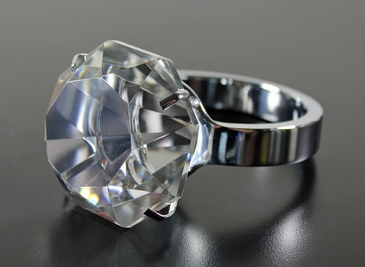
Now, Priscilla wasn't the easiest person to please, and she had expensive tastes (see our earlier stories about her engagement ring). So a simple gift wouldn't do at all. But the problem was that Priscilla had everything, and with her $50 million annual salary (plus bonuses, of course) she could afford just about anything many times over that Marvin could manage on his relatively paltry $10 million per year.
Marvin was at home on a Monday. The Doublejumpers had one day off before starting a match with the Denver Dundees the following day. That match would run through Thursday, followed by Valentine's Day off. Priscilla, of course, was at work. Monday through Thursday, Priscilla worked from about 7 AM until at least 7 PM.
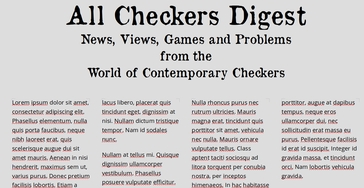
Marvin had a little time to think about an appropriate gift. He had been reading the latest issue of All Checkers Digest and had found an interesting problem.
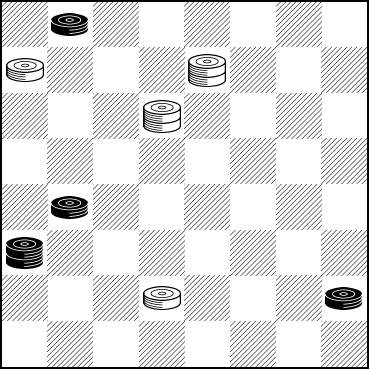
WHITE
White to Play and Win
W:W5,K7,K10,26:B1,17,K21,28
"No," Marvin said to himself, "a gift first." So he browsed the internet, looking first at expensive jewelry. But Priscilla didn't need another necklace or bracelet or earrings. Maybe an ankle bracelet? "Nah, she never wears stuff like that."

Marvin started looking at catalogs from art dealers. Priscilla's 5,000 square foot upscale condo featured a few originals by well-known contemporary artists. But when Marvin saw the prices, he knew he had better keep looking.
He spent nearly two hours. Jewelry? No. Artwork? No. Clothing? No. A new car? Priscilla had a whole fleet of cars and she replaced them with new ones every year.
Marvin, his eyes tired and his mind exhausted, didn't know what to do.
And then it came to him.
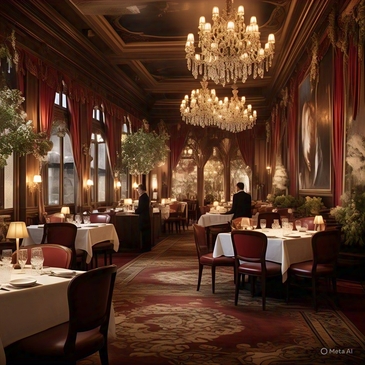
Marvin and Priscilla had been to a holiday event at the upscale restaurant, Le Menu Magnifique and Marvin decided to take Priscilla there for Valentine's Day. He had to pull a few strings to get a reservation on such a busy day, but as Marvin was a checker superstar the restaurant was willing to accommodate him.
Priscilla was unusually pleased. "How nice of you, Marvin," she said when he told her about it, "I'm sure we'll have a great time."
Marvin, whose tastes ran more to hot dogs and beer than haute cuisine and fine wine, wasn't so sure, but he wanted to please his wife, and seemed to have hit the mark.
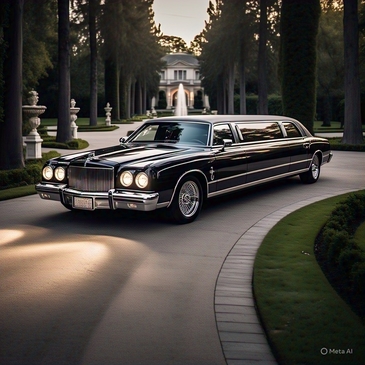
"We'll take my limo," Priscilla said, "so you won't have to drive the Lexus. That car is a little too ordinary for the occasion."
Marvin's old Volkswagen was a thing of the past; Priscilla had bought him a Lexus and that's what he now drove. "I could drive the Rolls," he suggested.
"No, I don't think so." Priscilla's Rolls Royce, as well as her Jaguar, Mazeratti, Aston Martin, and Ferrari, were cars that she alone drove.
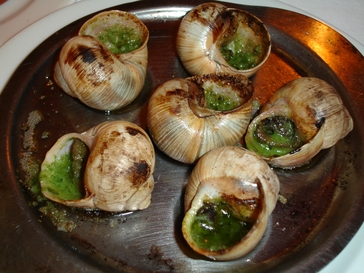
J. Patrick Fischer --- Creative Commons 3.0
At the restaurant, they shared appetizers of Escargot a la Maison and Crevettes du Roi, along with glasses of Chablis. For dinner, Priscilla ordered Coq au Vin and Marvin, Steak au Poivre. The waiter looked surprised and asked why they were ordering such pedestrian fare, but a glare from Priscilla stopped him in his tracks. They had a nice Burgundy with their "plats."
Dessert, of course, was taken from a selection of patisserie. Then there was coffee and cognac. Finally, the time came for Marvin to present his gift.
"I have something for you, sweetheart," Marvin said.
"I was starting to wonder," Priscilla replied. "You're quite good at forgetting on gift giving occasions."
"Not this time!" Marvin smiled. "It was kinda hard, seeing like, you know, you already got so much stuff and all. But--- well, anyhoo, here you go."

Marvin reached into an inner pocket of his suit jacket, and brought forth a business letter sized envelope. On the front he had written, "Priscilla." He handed it to his wife.
"I was gonna write 'Prissy' only on account of you don't like that so much I wrote 'Priscilla.'
"How nice of you," Priscilla replied, the edge in her voice clear. But then she smiled and opened the envelope.
Inside was a sheet of letter paper. She unfolded it and saw the following, printed in 12-point Times New Roman.
Oh, my dear love, how vast this heart does swell,
Each beat a song that sings of you alone.
In every glance, in every word, you tell
A truth that makes my soul feel fully known.
Your smile, a light that brightens up the day,
Your touch, a warmth that comforts through the night.
With you, the world's a place where I can stay,
Where every moment feels so pure and right.
The stars above seem dim compared to you,
Your love, a force that guides me through the storm.
Together, all our dreams are born anew,
In your embrace, I find my truest form.
On this sweet day, my heart is yours to keep,
A love so deep, it wakes me from my sleep.
"This is a sonnet," Priscilla said. "Did you actually write this, Marvin?"
"Well, uh ... well, not exactly write it," he said. "I uh ... um ... yeah ... "
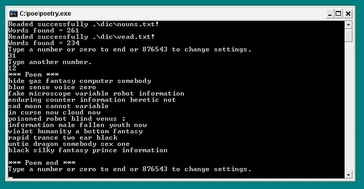
"Oh my goodness," Priscilla said. "You got this off of one of those AI sites, didn't you? It's so sappy it's beyond even a HatchMark greeting card ... no poet would ever write stuff as bad as this."
"Don't you like it? I couldn't think of nothing to give you so I thought, like, something personal from me ... "
"Personal? From you? When you had a computer write it? This is a joke, right? You have a real gift for me, I assume?"
"Uh well, like I said, there ain't nothing you don't already got so, uh, I guess that's it."

"That's my Valentine's gift? A lousy computer sonnet?" Priscilla threw her napkin on the table and pushed her chair back. As she stood up, she said, "Sometimes I wonder why I married you, Marvin. I'm taking the limo home now. You can pay the check and then take the bus for all I care. Well, here's something from me to you--- from the same source." Priscilla tapped on her cell phone for a moment and then texted Marvin the following lines as she made an angry exit from the restaurant.

Roses are red, but my patience is thin,
I'm tired of your games, I'm done with your spin.
You promised a gift, but you lied through your teeth,
Now I'm standing here, feeling bitter beneath.
You say you care, but your actions don't show,
Your empty words cut deeper than you know.
I gave you my heart, but you threw it away,
Now I'm counting the moments til you're out of my day.
Valentine's feels like a cruel little joke,
When your love is a flame that just up and broke.
So here's to the truth, though it's hard to admit---
I'm angry, I'm hurt, and I'm done with this bit.
Happy Valentine's, if that's what you need---
Just know I'm moving on, I've planted the seed.
Marvin, now sitting alone at the table, muttered, "I just don't get women sometimes."
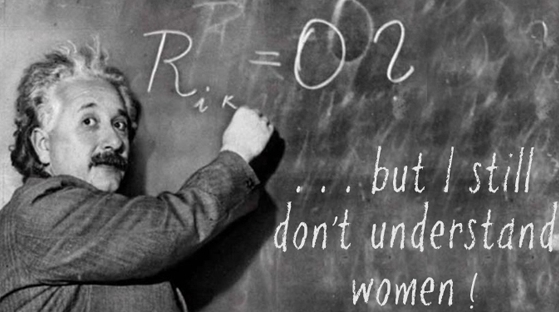
We should note that we actually did use an AI site to generate the truly terrible sonnets above. (We did a little editing as one line was not suitable for all audiences.) We disdain, however, to use AI to produce even a single word of our columns and stories.
Marvin is once more in hot water. That seems to be a recurring problem for him. But speaking of problems, the one he was looking at in All Checkers Digest is quite interesting. Why don't you give it a try? When you're ready you can click on Read More to see the solution. And--- we do hope you didn't forget that special someone on Valentine's Day, and we also hope you avoided computer generated poetry.![]()
Checkers Are Red: A Beacon Cafe Story
Sal Westerman, the unofficial leader of the Bismarck, North Dakota's Coffee and Cake Checker Club couldn't believe his eyes.
It was a cold Saturday afternoon in February, 1955, and his club's weekly meeting was about to start. His little group got together at 1 PM each week at the Beacon Cafe in the Provident Life Building on Rosser Avenue, from just after Labor Day to just before Memorial Day. The club members, or "boys" as Sal called them, were almost all over 50 years of age and enjoyed solving problems, playing skittles, talking checkers, and sampling fabulous baked treats homemade by the Cafe's proprietress, Deana Nagel.
Sal had just made the 10 minute walk from his home to the Cafe. He was cold and anxious to go into the warmth of the Cafe, but what did he see?
A picket line!
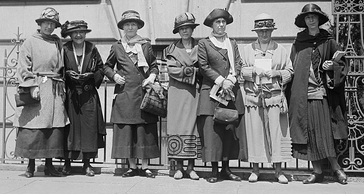
About half a dozen middle aged protesters were marching back and forth in front of the Cafe, holding signs lettered with the folllowing messages.
"Checkers --- the Game of Communists!"
"Think of the Children --- Ban Checkers Now!"
"Checkers --- The Ruin of the American Way!"
"National Service, not Checkers!"
"Patriots Don't Play Checkers!"
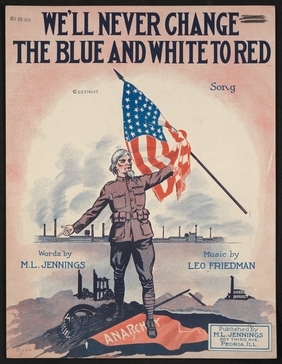
Sal, bewildered, approached the front door of the Cafe, but several of the protesters bumped into the old gentleman and nearly sent him sprawling.
Deana, inside the Cafe observing what was happening, came through the door and roughly shoved a couple of protesters aside, making a path for Sal to enter. It seemed as if violence could possibly erupt but Deana quickly closed and locked the door behind her.
"I've called the police," she said to a flustered Sal, whose face was red and who didn't look well. "Sit down, Sal," she continued, "catch your breath. Those people should know better than to jostle an elderly person."
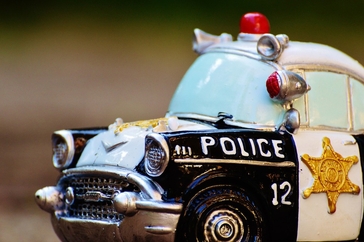
Sure enough, two police cars arrived a few minutes later and four burly policemen exited.
"You're blocking a public sidewalk," one of them was heard to tell the protesters. "Disperse at once or be arrested."
There were a few angry shouts from the protesters and one of them looked as if he was about to swing his sign at one of the police officers, but when he noticed the officer's hand resting on his service revolver holster, he thought better of it.
The protesters kept shouting but they all walked away, likely headed home to get out of the cold themselves. The police officers left without any further incidents taking place.
"What was all that?" Deana asked.
"There was something in the newspaper this morning," Sal said, "but I didn't know it would come to this. I certainly didn't think they would know about our club meetings."
Now that the sidewalk was cleared, a few of the boys started to come into the cafe. Dan and Wayne were first; they mentioned to Sal that they had almost gone back home when they saw the angry group of picketeers, but then when they police arrived they decided to wait it out. Tom and Larry arrived next, followed by Mike and Delmer. They all listened as Sal recapped the newspaper story.
"It seems that these folks are kind of leftovers from the McCarthy days," Sal began. The boys nodded; they certainly recalled the "Red Scare" that had only come to an end a year or so ago.

Sal continued, "Somehow they think the red and white checker pieces are really symbolic of the Red Russians and the White Russians, from back in the days of the Russian Revolution. Obviously the Reds came out on top. What this has to do with checkers is beyond me, but the article goes on to talk about how the group thinks checkers is a Communist plot to distract Americans from our democratic principles, our American work ethic, and so on. They say anyone who plays checkers is a Red, even if they play the white pieces."
The boys all laughed at that, but it was a nervous sort of laughter.
"Unbelievable," Mike said, "and don't they realize most of us served during the war?" (Editor's note: See our previous Veterans' Day story.)
"Shades of Harvey Hopkins," said Dan, referring to a late 19th century Chicago checkerist who said that nighttime baseball caused youth to degenerate, "except it's checkers instead of baseball, and it's Communism instead of crime."
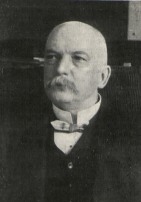
Harvey Hopkins
"No doubt they don't like baseball either," said Delmer, "after all one of the teams is named the Red Sox."
"So what should we do?" said Dan. "The idea of them picketing in front of Deana's cafe isn't a pretty thought."
"Bad for business," Deana said from behind her counter. "I suppose they think cafes are Communist, too, because sometimes I use red food coloring in my baking."
"What's more serious," Sal said, "is their wanting to ban checkers from our schools. We all know that chess and checkers aids mental development, problem solving skills, and a lot more, but this group likely wouldn't agree."
"We need to all show up at that school board hearing next month," Mike said. "We have to make our case about checkers as a force for good rather than whatever they're making it out to be."
"The work of the Commies," said Wayne.
"What about Deana?" Sal asked. "We need to do something for her, too."

Deana's Lawyer
"I appreciate the thought, boys," Deana said, "but there's no need. On Monday I'm getting hold of my lawyer and we'll get a Temporary Restraining Order. One of them shoved Sal and I won't stand for it. I won't have any problem convincing the judge to grant the order. But hey, aren't you boys here for checkers? Come on, get with it; there's blueberry crumble today and we all could use a treat. On the house today." Deana paused a minute. "Although I suppose I should have served Red Rice as a lunch special."

The boys laughed again. "Thanks, Deana!" they said in unison.
"You're right, Deana," said Sal. "Let's not let the hooligans spoil our checker fun. I've got a nice problem for you boys to solve this afternoon, and no one has to worry about paying, thanks to Deana." The tradition was that Sal would show a problem, and if the boys (all of whom but one were at least 50 years old) solved it, Sal would buy treats; if they couldn't solve it, they would buy for Sal and his wife Sylvia.
Sal laid out the following position on one of the checkerboards.
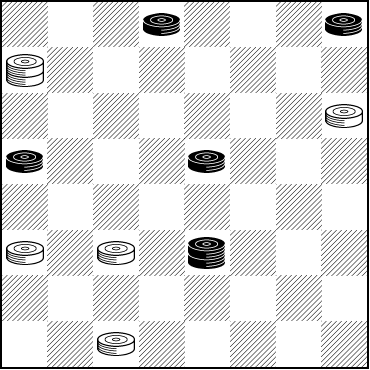
WHITE
White to Play and Draw
W:WK5,12,21,22,30:B2,4,13,15,K23
"We had a bit of a late start," he said, "so how about we keep it to 45 minutes?" But there was no response as the boys were already deep in study.
When the analysis was in full swing, Sal went over to Deana's counter and slipped her a $5 bill. "Nice of you to offer to treat," he said, "but I owe you for calling the police when things could have turned ugly."
"Thanks, Sal," Deana said. She then refilled everyone's coffee and after 45 minutes, Sal called 'time.'
Is anyone claiming checkers has an evil political side where you are? We'd be surprised if that were the case, and we certainly hope never to see such a thing. But we suppose anything is possible.
What should surely be possible is for you to solve today's problem, and we ask you to give it your best try. When you're ready, don't protest; just click your mouse on Read More to see the solution and the brief conclusion to our story. And do note that our diagram shows white and black pieces, not white and red.![]()
The Checker Maven is produced at editorial offices in Honolulu, Hawai`i, as a completely non-commercial public service from which no profit is obtained or sought. Original material is Copyright © 2004-2025 Avi Gobbler Publishing. Other material is public domain, as attributed, or licensed under Creative Commons. Information presented on this site is offered as-is, at no cost, and bears no express or implied warranty as to accuracy or usability. You agree that you use such information entirely at your own risk. No liabilities of any kind under any legal theory whatsoever are accepted. The Checker Maven is dedicated to the memory of Mr. Bob Newell, Sr.


